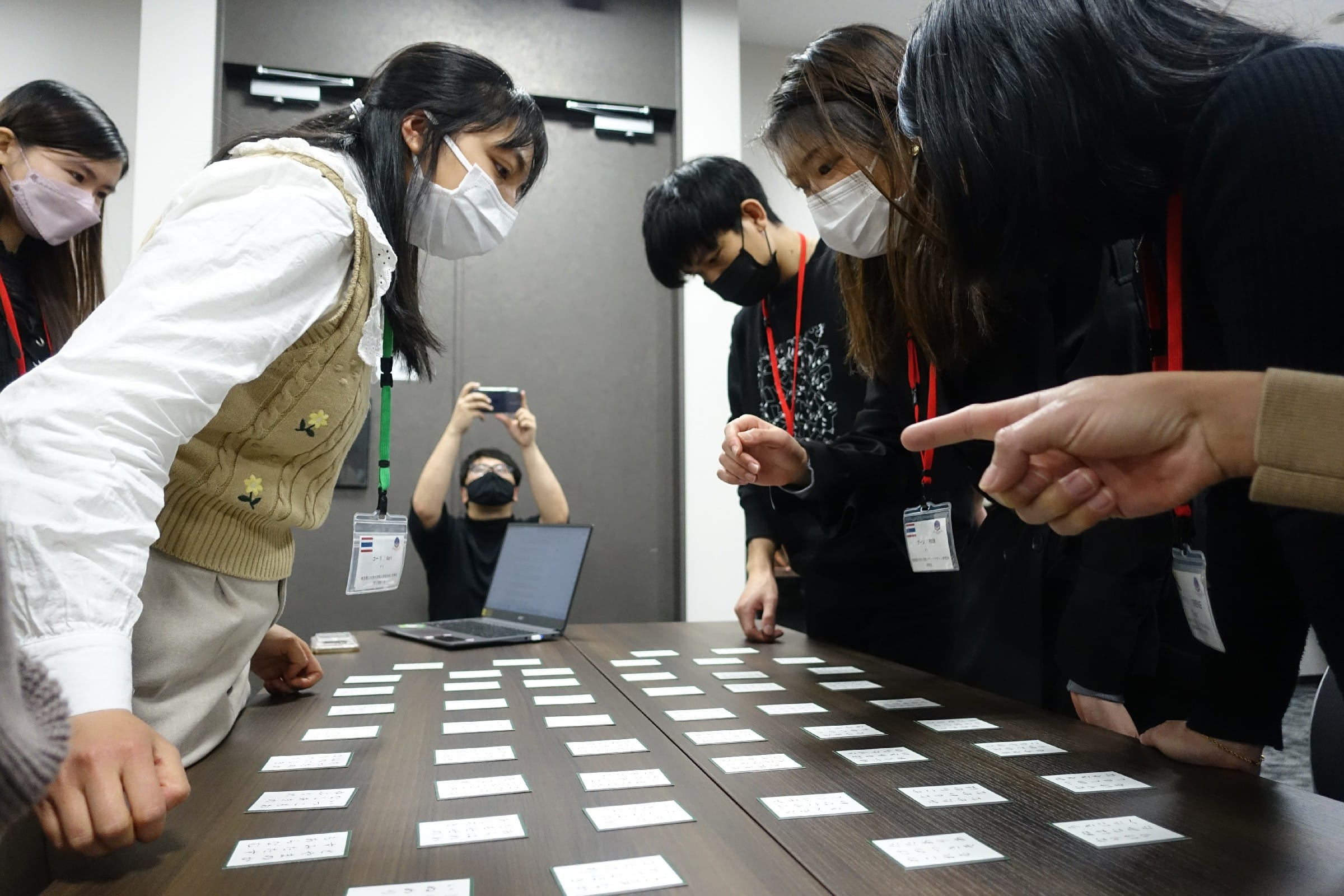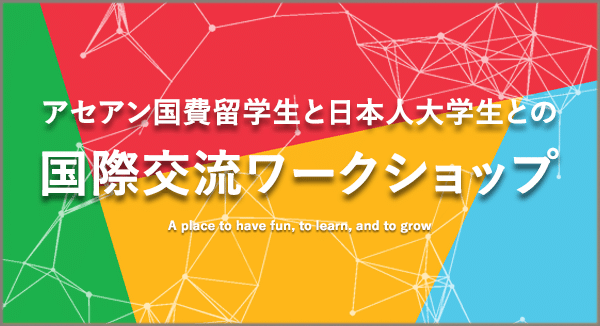「事務局からの活動報告」とは
この度、アスジャ・インターナショナルの日々の事業運営について、アスジャ事務局からご報告する「事務局からの活動報告」を新設いたしました。
活動報告は、現在アスジャ事務局でスタッフとして勤務しているアスジャ国費留学生・修了生のアルバイト・スタッフ、通称「バイト生」が担当いたします。
事務局スタッフでもあり、アスジャ生・修了生でもあるバイト生の目線で、アスジャの活動について報告いたします。
初回に続いて、今回もアスジャ初の〈百人一首〉かるた大会についての活動報告になります。
アスジャでは百人一首のかるた大会を2023年2月25日に(土)にハイブリッド形式で実施し、対面参加のアスジャ生とオンライン参加のアスジャ生が協力しながら日本の伝統的な遊びであるかるたを体験しました。
今回の活動報告では、かるた大会当日の様子について、二人のアスジャ生によるレポートをご紹介させていただきます。
アスジャ生レポーターによる日本語(編集:アスジャ事務局)
私たちは留学生として、今回オンラインでアスジャのかるた大会に参加する機会があり、それはすばらしい経験でした。大会は新宿にある会議室で行われ、多くのアスジャ学生達が集まっているのを見て驚きました。
この大会では、私たちはかるた競技をするためにグループとして取り組んでいました。アスジャ学生は6つのグループに分けられたので、2つの競技があります。大会はオープニングセレモニーで始まり、かるた競技のルールが説明されました。プレイヤーたちが見せた集中力とかるた競技に専念する気持ちのレベルには驚かされました。かるた競技は、かるたカードの位置を記憶し、呼び出されたら素早く一致するカードを取ることが必要です。プレイヤーたちの稲妻のような反射神経と迅速な思考力は、本当に素晴らしいものでした。
カルタでは、読み手が言っていることに集中しながら、素早くカードを探すために、プレイヤーは深い集中力が必要です。プレイヤーのデッキにない歌もあり、プレイヤーはプレッシャーに負けて勘でカードを取るべきではありません。かるたは、相手のカードを取りながら自分のカードを守るために、集中力、スピード、技術が必要で、常に冷静な心が必要なゲームです。
-
このゲームには強い伝統と文化があることが期待されています。私たちが学んだ資料によると、プレイヤーは伝統的な衣装を着て、畳の上でゲームを行う必要があります。しかし、今回のイベントはすべての伝統的な習慣に従わなかったが、伝統に対して非常に敬意のある雰囲気がありました。私たちはゲームとプレイヤーに対する敬意と尊重の感覚を感じることができました。アスジャ学生が優勝したとき、グループのメンバーは歓声を上げて手をたたきました。 本来のカルタの競技ではあまり見ないシーンですが、これは特別なことだと思います。最初、プレイヤーはカードを取ったり考えたりするのに時間をかけていましたが、時間が経つにつれて、プレイヤーはどんどん速くなります。その後、1回戦を勝ち抜いた2組が決勝戦に出場しました。
-
このゲームには強い伝統と文化があることが期待されています。私たちが学んだ資料によると、プレイヤーは伝統的な衣装を着て、畳の上でゲームを行う必要があります。しかし、今回のイベントはすべての伝統的な習慣に従わなかったが、伝統に対して非常に敬意のある雰囲気がありました。私たちはゲームとプレイヤーに対する敬意と尊重の感覚を感じることができました。アスジャ学生が優勝したとき、グループのメンバーは歓声を上げて手をたたきました。 本来のカルタの競技ではあまり見ないシーンですが、これは特別なことだと思います。最初、プレイヤーはカードを取ったり考えたりするのに時間をかけていましたが、時間が経つにつれて、プレイヤーはどんどん速くなります。その後、1回戦を勝ち抜いた2組が決勝戦に出場しました。
激しい競争にもかかわらず、プレイヤー同士には強い連帯感がありました。試合後にお互いを祝福し、ヒントや戦略を共有することがよくありました。激しい競争とスポーツマンシップの組み合わせを見ることは、魅力的でした。
全体的に、かるた大会は私たちにとって忘れられない経験でした。プレイヤーのスキル、かるた競技にまつわる伝統と文化、そしてプレイヤー同士の強いコミュニティ感覚に感銘を受けました。日本文化と伝統的なゲームへの愛情を深く理解することができました。
アスジャ生レポーターによる原文(英語)
As international students, we had the opportunity to attend a Karuta competition in ASJA online and it was an incredible experience. The competition was held in a meeting room in Shinjuku, and we were surprised to see so many ASJA students gathered there.
In this competition, we worked as a group to play games. ASJA students were divided into 6 groups, so there were 2 games. The competition began with an opening ceremony, where the rules of the game were explained. We were blown away by the level of concentration and focus the players showed. The game requires memorising the positions of the cards and quickly taking the matching cards when called. The lightning reflexes and quick-thinking skills of the players were truly amazing.
Karuta requires deep concentration from the player to find the cards quickly while concentrating on what the reader is saying. Some poems are not in the player’s deck, and players should not follow their intuition to take cards based on pressure. Karuta is a game that requires concentration, speed, skill, and a calm mind at all times in order to protect your own cards while capturing the opponent’s cards.
The game is expected to have a strong tradition and culture. From what I have learned, the players are required to wear traditional clothing and play the game on tatami mats. However, although this time the event did not follow all traditional customs, there was still a very respectful atmosphere. We could feel a sense of respect and respect for the game and the players. The members of the group cheered and clapped their hands when they won. We don’t see it much in the original Karuta game, but this is something special. At first, players were taking some time to think and catch cards, but as time went on, players got faster and faster. After that, the two teams that won the first round advanced to the finals.
Despite the fierce competition, there was a strong sense of solidarity between the players. They often congratulated each other after matches, sharing tips and strategies. It was fascinating to see the combination of fierce competition and sportsmanship.
Overall, the Karuta tournament was an unforgettable experience for me. We were impressed by the skill of the players, the traditions and culture surrounding the game, and the strong sense of community among the players. We were glad that we were able to gain a deeper understanding of Japanese culture and love for traditional games.
今回はアスジャ初の〈百人一首〉かるた大会を現役アスジャ生の体験を交えての紹介になりました。今後もこのようにアスジャが開催・実施する事業をバイト生の目線で報告させていただきます。
次回の活動報告は2年ぶりに開催されたアスジャの「日本人学生との国際交流ワークショップ」についてになります。
そして、今回の〈百人一首〉かるた大会の具体的な様子はこちらのページから確認できますので、是非ご一読ください。





